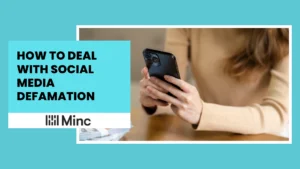
- Originally Published on May 10, 2024
What to Know Before Posting In an “Are We Dating the Same Guy” Group
Online forums can offer a sense of community and support—but they also come with risks. Perhaps you shared your experience with a man in a popular Facebook dating group, and now you are being threatened with an “Are We Dating the Same Guy” lawsuit. In these situations, it may be difficult to know how to respond or fight back.
If someone is threatening to sue you over a post you made in an “Are We Dating the Same Guy” group, we recommend taking the following steps:
- Do not ignore the threat,
- Do not engage with the plaintiff publicly,
- Preserve evidence of the situation,
- Remove the post from Facebook, and
- Seek legal advice from a defamation attorney.
In this article, we explain what “Are We Dating the Same Guy” groups are and the risks they pose for members. We also explore legal considerations to keep in mind before posting in one of these groups—and how to respond if you are being threatened with a lawsuit.
Video: Can I Be Sued for a Post on AWDTSG?
Watch this video to learn more about the legal implications of posting on AWDTSG and how to avoid becoming the target of an are we dating the same guy lawsuit.

What is “Are We Dating the Same Guy”?
“Are We Dating The Same Guy” (AWDTSG) groups are city-specific Facebook groups where women warn each other about predatory men, potential cheaters, and men with dating “red flags.”
The first AWDTSG group was founded in 2022 for residents of New York City. Since then, more of these Facebook groups have appeared in almost every major U.S. city as well as a few international locations. There are currently more than 200 AWDTSG groups, with over 3.5 million members globally.
Rules for Posting in AWDTSG Groups
AWDTSG groups have strict rules on who can join and what kinds of posts are acceptable. However, it can be difficult to moderate these groups as their memberships continue to grow.
Most AWDTSG groups prohibit posts that contain accusations or personal information about the men being discussed. Users are expected to post anonymously, and a typical post includes a photo of a man’s dating profile, his first name, and a caption like “Any red flags or tea?” The poster might then add more context about the man in the comments.
Sharing identifiable information—such as the man’s last name, contact information, or employer—is against the rules. Posts should also not include accusations, controversial content, or “hot takes” designed to start an argument. Users are asked to comment only if they know the man personally—and everyone should refrain from speculation and looks-based comments. Most groups also do not allow harassment, defamation, or bullying.
These groups also typically do not allow men to join. Anyone requesting to join an AWDTSG group must answer questions about their reasons for joining and agree to group rules. Users are also asked not to screenshot or share group posts elsewhere.
Legal Considerations Before Posting in “Are We Dating the Same Guy” Forums
While these groups are designed as a safe and empowering space for women, they can quickly become a legal minefield. Before posting about an ex or acquaintance in an AWDTSG group, be sure you understand the potential risks.
It is easy to feel anonymous and untouchable on a private online forum, but this feeling rarely reflects reality. Just because the group is set to “private” does not mean your posts will not be found—and neither does deleting your posts later. Unless you are using a VPN, your posts can usually be traced back to you.
It is safe to assume anything you post will be seen by the post’s subject eventually. If you choose to post in an AWDTSG group, make sure you are speaking the truth—backed by facts and evidence. Do not make assumptions or exaggerations.
Below, we explore risks and legal considerations to keep in mind when deciding if posting is worth it.
Defamation
In the U.S., your right to free speech is protected by the First Amendment. But that right is not absolute; you do not have the right to defame others.
State definitions vary, but defamation is generally defined as a false statement, communicated to a third party, that damages the subject’s reputation. Sharing a true dating experience in an Are We Dating the Same Guy group likely does not qualify as defamatory. But if you give in to the temptation to embellish your story or fabricate an experience, you might be liable for defamation if your statements harm the subject’s reputation.
Do not trust your group’s moderators to make judgments on what posts are safe to publish. Most AWDTSG group moderators approve posts before publishing them in the group—but they are simply checking that the post follows group rules. Moderators generally do not have the legal knowledge or familiarity with your situation to know whether your post is safe to publish.
Remember that you are ultimately responsible for what you post in an AWDTSG group.
Online Harassment
Another risk of posting in an “Are We Dating the Same Guy” group is inciting online harassment against the subject. Unfortunately, AWDTSG groups can often become hostile toward the person named in the post. Users may pile on in the comments and escalate into speculation, cyberbullying, and toxic behavior.
Legally, harassment is defined as targeting an individual with repeated, distressing behavior that threatens their safety or mental health. In the age of the internet, online harassment and cyberbullying are unfortunately extremely common. In large groups like AWDTSG, groupthink (and a false sense of anonymity) are breeding grounds for this behavior.
If your post and the ensuing group harassment cause the post’s subject real-world suffering, the victim may have criminal and civil claims against you.
Doxxing
Often part of a larger harassment or cyberbullying campaign, doxxing (or doxing) occurs when the victim’s identifying information is shared online. This information could include their full legal name, employer, or contact information.
Doxxing is a dangerous activity that can often result in real-life harm and harassment. If you include identifying information about a post’s subject in an AWDTSG group, you could be legally liable for doxxing them.
To learn more, please watch this video explaining the legal implications of doxxing:
Invasion of Privacy
Invasion of privacy is also known as the publication of private facts. This act could include publicly sharing a person’s information, portraying them in a false light, intruding on their solitude, or misusing their name and likeness.
Keep in mind that posting content to an AWDTSG group can be an invasion of the subject’s privacy, even if the contents are true. For example, sharing private information about a man’s marital strife or sexual orientation could constitute an invasion of privacy.
Tortious Interference With Contract
There is a reason moderators of most AWDTSG groups prohibit sharing a man’s workplace. If that man is fired because of a post you made in one of these groups, you could be sued for tortious interference.
Tortious interference is the act of improperly instigating a breach of contract between the victim and a third party. If you or group members share your post with the man’s employer demanding his termination, that act could constitute interfering with his employment contract.
Intentional Infliction of Emotional Distress
If a post in an AWDTSG group is outrageous or extreme enough, it could give rise to a claim of intentional infliction of emotional distress. Keep in mind that the subject of your Facebook posts could sue you for causing emotional distress if your content sufficiently harms their mental and emotional health.
What to Do if Someone Is Threatening to File a Lawsuit Against You Over AWDTSG Posts
Social media posts can have outsized effects on a person’s real-world life and reputation. So it is not surprising that some men affected by AWDTSG posts decide to sue the posters for defamation or other claims listed above.
Just this year, one California man filed several lawsuits against women who had posted about their experiences with him in an AWDTSG group. The cases were dismissed in this instance, but it is a reminder that the risk of having a lawsuit filed against you is very real.
If you are being threatened with a lawsuit because of something you posted in an AWDTSG group, it is important to act quickly. Below, we provide a few actionable steps for protecting yourself in a potential defamation lawsuit.
Do Not Ignore the Threat
While it might be tempting to dismiss a legal threat as bluster, it is important to take it seriously. It is increasingly common for men to file lawsuits over AWDTSG posts. Ignoring the threat could lead to legal actions being taken against you without your prepared defense.
Do not ignore a cease and desist letter if you receive one. Similarly, it is crucial not to ignore a summons and complaint. If you do, you could face serious consequences, like a default judgment being entered against you. Contact an attorney to discuss your options on how to resolve the situation in your favor.
Do Not Engage Publicly
While you may want to defend yourself if you are being accused of defamation or cyberbullying, avoid the temptation. Do not discuss the threat or the situation publicly, especially on social media. Remember that public statements can be used against you in legal proceedings.
Preserve Evidence
Make sure to keep copies of the post in question and any other relevant documentation. You should also preserve all interactions and correspondence related to the threat, such as emails, letters, and direct messages. This evidence could be crucial in any legal proceedings.
Remove the Post
Once you have saved copies of the post and related evidence, delete the post from the Facebook group.
Removing a post in an AWDTSG group does not stop the plaintiff from suing you over it. However, deleting the offending post can demonstrate to a court that you tried to mitigate any harm it caused.
Seek Legal Advice
Finally, contact a legal professional who specializes in the relevant area of law, such as defamation, privacy, or intellectual property. They can advocate on your behalf while providing you with advice tailored to your specific situation—including whether the threat has legal merit and how best to proceed.
There is no one way to handle these types of matters, and your post’s contents dictate how an attorney can navigate your situation. If you received a cease and desist or retraction demand letter, an experienced attorney can review the letter and respond on your behalf. They can work to negotiate a resolution for all parties.
If you were served with a defamation lawsuit, an attorney can respond by filing an answer or motion to dismiss on your behalf.
How Minc Law Can Help
If you are being threatened with a lawsuit over a post in an “Are We Dating the Same Guy” group, do not hesitate to reach out to us. In most situations involving an AWDTSG group, the best solution for both parties is to sign a mutual non-disparagement agreement. In that scenario, the poster deletes its post, and both parties can move on without worrying about the threat of litigation.
At Minc Law, our experienced legal team knows how to resolve AWDTSG disputes while minimizing both cost and mental distress. You can contact us by reaching out to a Minc Law Chat Representative, filling out our contact form, or calling us at (216) 373-7706.
Get Your Free Case Review
Fill out the form below, and our team will review your information to discuss the best options for your situation.


